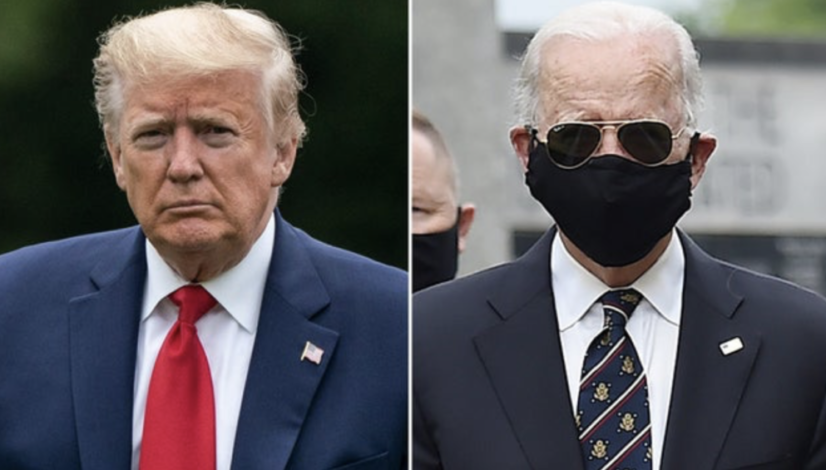Investors want Trump reelected

What do investors want? Low rates, an opened-up economy — and a Donald Trump victory in November.
According to a private survey by ISI Evercore, professional investors are alarmed by recent signs that presumed Democratic nominee Joe Biden is leading President Trump by an expanding margin. On June 8, CNN published a poll showing the former vice president ahead of Trump by 14 points, and the market swooned, racking up a three-day loss of nearly 9 percent.
Coincidence? Hardly.
What’s wrong with Biden? In brief, we’re in a recession. A short one, maybe, but a sharp downturn nonetheless, and we will need the right policies to bring us out of it.
Investors remember the last recession, and how the Obama-Biden team produced the slowest recovery since the Great Depression. As King’s College economist Peter Ferrara wrote in 2018:
“…in the 11 previous recessions since the Depression, the economy recovered all jobs lost during the recession an average of 27 months after the recession began. In Mr. Obama’s recovery, dating from the summer of 2009, the recession’s job losses were not recovered until after 76 months—more than six years.”
Ferrara further noted that in those past 11 recessions, the economy made up lost GDP “within an average of 4.6 quarters, or a little over a year. It took Mr. Obama’s recovery 14 quarters, or 3½ years, to reach that point.”
Heaven forbid we go down that path again.
To be sure, investors’ number one concern these days is that we will experience a “second wave” of coronavirus infections, which might lead to another round of shutdowns.
But their second biggest worry, according to ISI, is that President Trump might lose his reelection bid. In their most recent survey, for the first time, a majority of the respondents – 58 percent – expect Biden to win in November. Only 42 percent picked Trump.
That’s a complete reversal since late April, when fully 58 percent thought Trump was a shoe-in, while 42 percent chose Biden.
ISI’s soundings track closely with professional betting odds on the November election. According to RealClearPolitics, the average odds crossed to favor Biden on June 2; he now leads by about ten points.
Biden’s most recent surge follows the death of George Floyd and ensuing protests. President Trump has been judged inadequately empathetic in his response to the killing of Floyd and overly hostile to the violence that followed.
The country is anxious — because of the pandemic, the protests, and, lest we forget, because more than 20 million Americans are out of work.
Soaring unemployment has reestablished the economy as a top concern of voters. In that ominous CNN poll, 77 percent of respondents said the economy was either “very” or “extremely” important to their vote, ahead of the coronavirus, health care or race relations.
More than half – 51 percent – of those surveyed picked Trump to better manage the economy, compared to 46 percent who chose Biden. That includes 56 percent of independents who preferred Trump’s handling of the economy compared to only 40 percent who thought Uncle Joe would do a better job.
Why do so many support the president, even as many of the gains enjoyed in his first three years have been lost to the coronavirus?
Recent history is on Trump’s side. Trumponomics, the combination of lower taxes and reduced regulations, succeeded in creating a booming jobs market that benefited all Americans. Entire categories of workers – ex-felons, persons with disabilities, those without a high-school degree; groups who have traditionally struggled to find the first rung on the economic ladder – could find employment.
At the end of last year there were a half million more jobs available than workers to fill them, according to JOLTS data, a bounty not seen for decades.
Trump took on difficult issues like our trade imbalance with China, demanding and eventually securing more equitable treatment for American companies and workers. He also called out Beijing for its state-supported cyberattacks and theft of U.S. intellectual property.
Americans backed this toughened stance against our biggest rival; a poll published last fall showed that over two-thirds of voters supported Trump’s confrontation with China over trade, even as they acknowledged that the U.S. was suffering from the tariff war then taking place.
Trump’s policies worked until COVID-19 caused a voluntary shut-down of activity, a first for the nation.
Biden promises more regulation and higher taxes — a return to Obamanomics, but on steroids. Like his party, Biden has lurched leftward to appease young progressives enamored with the socialist policies of Sen. Bernie Sanders (I-Vt.).
Consequently, Biden has promised to raise taxes by an estimated $3.2-$3.8 trillion over the next decade, which, according to the non-partisan Tax Foundation, would depress GDP by 1.5 percent, suppress wage growth and cost nearly 600,000 jobs.
He wants to ramp up oversight of our country’s businesses and pledges tougher enforcement of all kinds of new rules, like those governing labor and union efforts. This is exactly the Obama playbook, which soured business confidence and torpedoed investment.
Biden promises to rebuild the nation’s infrastructure. To accomplish that, he says he will “emphasize a robust public engagement process in planning all new transportation projects.” Can you imagine? As if ten and twenty-year delays in today’s undertakings weren’t bad enough.
Someone needs to ask Joe Biden, if he ever emerges from his basement, why this time would be different. And why did he and President Obama neglect some of the items uppermost in his platform — like investing in infrastructure?
Biden has put “rebuilding the middle class” at the heart of his program, but the Obama-Biden White House embraced numerous trade deals that sent hundreds of thousands of jobs overseas and never took on Beijing. Even critics on the left complained that he had abandoned campaign pledges to help American workers.
Biden served in the Senate for 36 years and was vice president for eight. Voters should ask, does Uncle Joe really deserve another shot?




